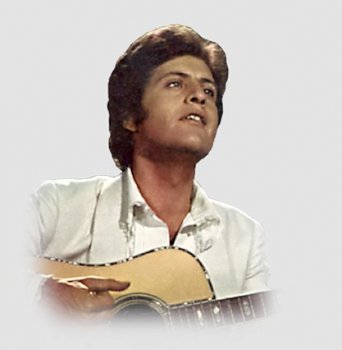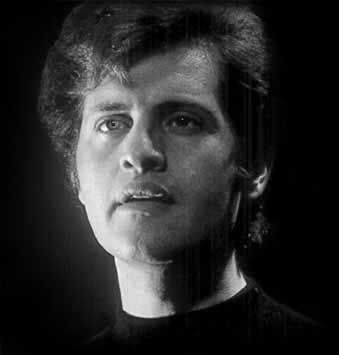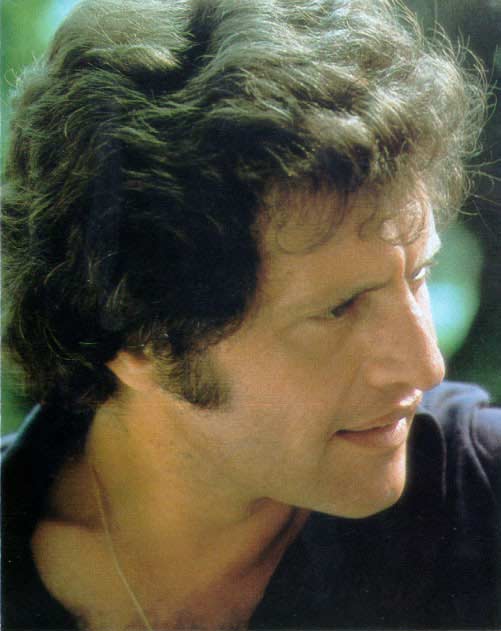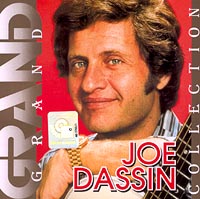

SALUT Привет, это снова я! Привет, как твои дела? Там день уходил за днем, Был вдали мой дом, Сердце - у тебя! Долгий мой путь позади, Я чуть устал им идти. Сделай мне кофе прошу, Сказку одну я тебе расскажу: Жил был однажды чудак - Ты ведь звала его так? Вечно он где-то скитался... Он пропадал, он возвращался... Привет, это снова я! Привет, как твои дела? Там день уходил за днем, Был вдали мой дом, Сердце - у тебя! Знаешь, я стал другим, Сны снятся таким - Про тебя, про меня, про нас... Глупые сны в который раз! Нечего больше сказать, Лишь иногда вспоминать Может быть будешь и ты О том, кто тебе говорил: Привет, это снова я! Привет, как твои дела? Там день уходил за днем, Был вдали мой дом, Сердце - у тебя! Авторы перевода - Андрей Мушенков и Алена Казанцева.
Если б не было тебя ... Скажи, зачем тогда мне жить?-В шуме дней- как в потоках дождя -Сорванным листом кружить. Если б не было тебя, Я б выдумал себе любовь, Я твои- не искал бы черты. -И убеждался бы вновь и вновь, Что это все же ты... Если б не было тебя, То для чего тогда мне быть, День за днем находить и терять, Ждать любви, но не любить. Если б не было тебя, Я б шел по миру как слепой, В гуле сотен чужих голосов- Узнать пытаюсь голос твой. И звук твоих шагов... Если б не было тебя, И мне не быть собой самим, Так и жил бы, твой призрак любя, Призраком твоим любим. Если б не было тебя, Я знаю, что не смог бы ждать, Разгадал бы секрет бытия, Только чтоб тебя создать И видеть лишь тебя... Если б не было тебя...
За тебя. я пью сейчас за красоту твою, За то, что ты со мною навсегда. За взгляд твой нежный, что ты даришь мне иногда. За тебя, за девочку, которой ты была, И та, которая в тебе сейчас. За твой секрет, твои мечты и что меня так любишь ты. Припев: За жизнь. За любовь, за ночи и дни, За то, что удача нам светит. И за тех, кто прид��т после нас в этот мир. В этот мир, что полон любви. За меня, за то, что голову я потерял. За то, что злюсь, не зная почему, За то, что лгу тебе о том, что я тебе не изменял. За меня, за то, что я тебя сумел найти. За то, над чем всегда смеешься ты. За недостатки мои и мечты, но я люблю и рядом ты. Припев За нас, за наше счастье, что мы сохраним. За то, что будет и что есть сейчас. За Землю и за города, пусть это будет навсегда. За нас, что мы с тобой мечтаем и поем. За то, что встретимся мы вновь и вновь. За всех влюбленных на Земле, за чувства наши, за любовь. Yana Denisova 2000
Вдво��м стоим мы на перроне Как будто вс�� же что-то жд��м И лодка жизни нашей тонет И не быть уже вдво��м Нам не быть уже вдво��м А поезд вдаль уносит Вс�� что я по жизни бросил С ним уедещь ты, это знаю я Но я тебя увижу Ведь любовью нашей движет Одна на двоих жизни линия Жила ты только в своих гр��зах А я смотрел лишь мои сны Амур, отчаявшись, лил сл��зы Неподвластны были мы Неподвластны были мы А поезд вдаль уносит Все что я по жизни бросил С ним уедешь ты, это знаю я Но я тебя увижу Ведь любовью нашей движет Одна на двоих жизни линия И будем жить как раньше жили Как знали нежность и печаль Как ненавидели, любили И нам прошлого не жаль Нет, нам прошлого не жаль...
 Тебе,
О том, как ты была прекрасней всех,
Как относилась ты ко мне всегда,
Признаньях нежных, но неискренних
Иногда.
Тебе,
О девочке, которой ты была,
И о такой, какая ты сейчас,
О твоём прошлом и делах,
Твоих интригах столько раз.
Припев :
О любви, о годах,
О ночах и о днях,
Возвращении вечном удачи,
Нас с тобою вдвоём,
О ребёнке твоём,
Мысли все о тебе и о нём.
Себе,
Я был безумцем, и ты здесь права,
Но почему я был так зол тогда?
О том молчаньи и изменах тех
Иногда.
Себе,
О тех годах, когда тебя искал,
Моих чертах, над чем сме��шься ты,
О недостатках, что скрывал,
Идеях вечной суеты.
Припев.
О нас,
О временах, что вспомним мы с тобой,
О настоящем и о будущем,
Планете нашей дорогой,
Но старой совсем.
О нас,
О планах, что с тобою обсуждал,
О первой встрече через много лет,
О тех счастливых, что я знал,
Любви, дающей счастья свет.
Александр Артёмов
Тебе,
О том, как ты была прекрасней всех,
Как относилась ты ко мне всегда,
Признаньях нежных, но неискренних
Иногда.
Тебе,
О девочке, которой ты была,
И о такой, какая ты сейчас,
О твоём прошлом и делах,
Твоих интригах столько раз.
Припев :
О любви, о годах,
О ночах и о днях,
Возвращении вечном удачи,
Нас с тобою вдвоём,
О ребёнке твоём,
Мысли все о тебе и о нём.
Себе,
Я был безумцем, и ты здесь права,
Но почему я был так зол тогда?
О том молчаньи и изменах тех
Иногда.
Себе,
О тех годах, когда тебя искал,
Моих чертах, над чем сме��шься ты,
О недостатках, что скрывал,
Идеях вечной суеты.
Припев.
О нас,
О временах, что вспомним мы с тобой,
О настоящем и о будущем,
Планете нашей дорогой,
Но старой совсем.
О нас,
О планах, что с тобою обсуждал,
О первой встрече через много лет,
О тех счастливых, что я знал,
Любви, дающей счастья свет.
Александр Артёмов
Словно дети,- мы строим иногда- Замок из мечты и песка. Замок тот, -что мы строим -навека -С собой уносят волны- навсегда. Я у моря выстроил для тебя- Замок из любви и песка В этом дивном замке, принцесса - ты, Но что твоей достойно красоты? А наутро берег -пуст, и ребятня замок ищет мой напрасно! Где мосты, где рвы и башни- из песка? От них нет и следа... Словно дети, мы строим иногда Замок из мечты и песка. В нём хватило б места тебе и мне, И всем другим влюблённым на земле. Я у моря выстроил для тебя Замок- из любви и песка. Но мою любовь волны смыли прочь, И счастье наше длилось только ночь... А наутро берег пуст, и ребятня Замок ищет мой напрасно. Где мосты, где рвы и башни из песка? От них нет и следа...
SALUT

American expatriate Joe Dassin was one of France's most popular singers during the late '60s and '70s, initially building his name with stylized adaptations of folk and country material from his birthplace. As his career blossomed, Dassin turned increasingly to traditional-style chansons penned by some of the genre's best writers, scoring an all-time classic with his 1975 smash "L'Etй Indien." Notorious for his perfectionism, Dassin could play the introverted romantic, but his persona also played off of American archetypes and imagery. His premature death of a heart attack in 1980 robbed French pop of one of its greatest modern-day practitioners. Joseph Ira Dassin was born November 7, 1938, in New York City. His father was future film director Jules Dassin, and his mother was Hungarian violinist Beatrice Launer. In 1940, the family moved to Los Angeles to further Jules' highly promising directing career; however, it was interrupted when he fell victim to the McCarthy-era blacklist. Moving to Europe in search of work, the family lived a migratory existence for a time, and finally settled in Paris in 1950. Joe's parents divorced in 1956; stung, he returned to the United States and enrolled at the University of Michigan, where he studied medicine and anthropology. In his free time, he worked as a radio DJ, and began singing folk songs and Georges Brassens compositions around the area with another French-speaking student. After returning to France, Dassin worked some low-level jobs in the film industry, including a few small parts in his father's movies; he also worked in radio and wrote freelance articles for Playboy and The New Yorker.In late 1964, at the urging of his future wife Maryse, Dassin made a demo recording for CBS France that turned some heads; soon, the label made him its first French signer. His debut single was "Je Change un Peu de Vent," an adaptation of the American folk song "Freight Train" with additional lyrics by Jean-Marie Rivat (who would become a frequent Dassin collaborator). It flopped, as did two EPs released in 1965. However, 1966's "Bip Bip" — an adaptation of John D. Loudermilk's "Road Hog" — was a hit, and CBS subsequently teamed Dassin with one of France's top producers, Jacques Plait. Minor hits in "Зa M'avance а Quoi?" and "Excuse Me, Lady" followed, but Dassin's career really took off when he was tapped to host the inaugural MIDEM music festival at Cannes in 1967; well covered by the French media, it gave him crucial exposure. Not long after, Dassin collaborated with Jean-Michel Rivat and Frank Thomas on an original work, the gunfighting-cowboy ballad "Les Dalton." Dassin had intended to give the song to another singer, but recorded it himself at Plait's vehement insistence; the result was a breakthrough smash hit, one that made Dassin a genuine star. His deep, charismatic voice and good looks made him highly popular with female audiences, but his American roots also lent him a certain novelty, a link to the free open spaces and flower-child optimism of his native country.Dassin had further success in the late '60s with hits like "Marie-Jeanne" (a version of Bobbie Gentry's "Ode to Billie Joe"), "Siffler sur la Colline" ("To Whistle on the Hill"), "La Bande а Bonnot," and "Le Petit Pain au Chocolat." He suffered a minor heart attack in 1969, but recovered to make a triumphant appearance at the Olympia in Paris later that year, and scored his biggest hit yet with "Les Champs-Elysйes," an international smash that broke him across Europe. Further hits followed in 1970 with "L'Amerique" and "Cйcilia" (the Simon & Garfunkel song), both adapted by legendary French songwriter Pierre Delanoй; he and Claude Lemesle gradually replaced Rivat and Frank Thomas as Dassin's primary suppliers of material. "La Fleur aux Dents" and "L'Йquipe de Jojo" were successes in 1971, and the following year, amid heavy international touring, Dassin bought a second home in Tahiti.1973 started well for Dassin, as "Le Moustique" and "Salut les Amoureux" became enormous hits. Sadly, though, his wife gave birth to a premature son who died not long after; always moody and private anyway, Dassin sank into a deep depression that effectively stalled his career for over a year. He recovered his momentum in late 1974 with the singles "Si Tu T'appelles Melancolie" and "Vade Retro," and in 1975 he scored the biggest hit of his career, the French pop classic "L'Йtй Indien" ("Indian Summer"), which was adapted by Delanoй and Lemesle from an Italian song ("Africa," by Albatros). "L'Йtй Indien" kicked off probably the most successful period of Dassin's career; over the next two years, he landed smash after smash, including "Et Si Tu N'existais Pas," "Salut," "Зa Va Pas Changer le Monde," "Le Jardin du Luxembourg," and "А Toi."Dassin divorced his wife in 1977 and married his new girlfriend early the next year. His first child was born later in 1978; by that time, disco had begun to take over the French music scene, and a new generation of pop singers were also making their presence felt. Dassin kept pace with "Si Tu Penses а Moi," a disco-reggae adaptation of Bob Marley's "No Woman No Cry," but although his international tours continued to sell out, the momentum of his recording career began to falter somewhat. He performed at the Olympia for what proved to be a final time in 1979; by the end of the year, his second marriage was on the rocks, and he suffered a heart attack. Early in 1980, not long after the birth of his second child, Dassin's marriage officially broke up. With his personal life in turmoil, and feeling the pressure for a comeback hit, Dassin suffered a heart attack that summer; while in the hospital, he also underwent surgery for a stomach ulcer. Nonetheless, Dassin attempted to make his way to his second home in Tahiti for a break from the pressure. During a layover in Los Angeles, Dassin suffered yet another heart attack; still, he pressed on with the journey. On August 20, 1980, while dining in a restaurant in Papeete, Tahiti, Dassin suffered a final, fatal heart attack; he was not quite 42 years old.